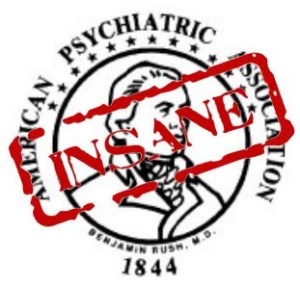Archive for the ‘Pedophilia’ Category
Has The APA Finally Lost Its Marbles?
After rejecting many previous proposals for parent alienation, parent alienation disorder is being considered. Considering the lack of scientific support and empirical research supporting a major clash with the proposal, the APA may be about to lose all credibility for its profession.
Request for DSM committee to meet with MAA’s
Posted by michaelmelsheimer on 2010-03-1 11:02:21, Monday
This is a project that B4U-ACT has been working on for the last couple of months. It is asking for a face to face meeting with certain members of the APA. Members of the larger community are BCC’d. Close to 2000 emails will go out eveyday `for about 6 weeks. B4U-ACT has had more people working on this project than any other in the past. The have done a great job. So, please wish them luck. They all need big hugs. It is a damn shame we can’t mention all of their names.
To: Dr. Ray Blanchard, chair,
Subworkgroup on Paraphilias for the Diagnostic and Statistical Manual V (DSM V),
American Psychiatrtic AssociationDear Dr. Blanchard:
We wish to follow up on our previous correspondence. The APA’s subworkgroup on the paraphilias, which you chair, is discussing significant changes to the Diagnostic and Statistical Manual (DSM) regarding pedophilia. As you know, we represent an organization that advocates for dialog between mental health professionals and people who are emotionally and sexually attracted to children or adolescents. We requested a meeting with your subworkgroup, based on the APA’s policy that work groups include representation from “patient and family groups,” that the revision process seeks “input from stakeholders,” and that DSM should be “sensitive to the needs of clinicians and their patients.” While you responded by offering to correspond with us by e-mail or telephone, we explained why we believe that is inadequate and requested a face-to-face meeting with at least one member of your subworkgroup. We did this in early January and have not received your reply.
Again, our rationale is that the DSM and mental health and criminal justice policies based on them have an enormous impact on all of society and on people who are attracted to children, including teenagers. They must be based on complete and accurate information. Yet the DSM is currently being revised in the absence of information from people in the general population who are attracted to children or adolescents. Instead, revisions are based on limited data from unrepresentative correctional populations who cannot be honest with researchers. It is well-known among social scientists that such data are highly biased and misleading. The lack of accurate information feeds irrational fears surrounding people who are attracted to children or adolescents. These fears are extraordinarily intense and lead to severe stigma and adversarial policies which force minor-attracted people into hiding, making the gathering of accurate information even more difficult. Perpetuating this vicious cycle neither protects children nor leads to effective policies. It renders the APA powerless to gather and disseminate accurate information.
We are proposing a solution to this otherwise intractable problem. We have organized a small group of minor-attracted people who are willing to meet with APA professionals. Face-to-face dialog with those of us not under the supervison of the criminal justice system is essential for gathering accurate information. We are also informing the public of our proposal by copying this email to researchers, mental health agencies, child protection organizations, political leaders, media outlets, and others.
We look forward to your reply.
Sincerely,
Michael Melsheimer, Director of Operations, michaelmelsheimer@b4uact.org
Richard Kramer, Program Planner, rkramer@b4uact.org
Paul Christiano, Communications Director, pchristiano@b4uact.orgB4U-ACT, Inc.
P.O. Box 1754
Westminster, MD 21158
410-751-9571
http://www.b4uact.org
The APA has had quite a history of promoting pedophilia. Here are a few quotes:
“the American Psychiatric Association (APA) recently sponsored a symposium in which participants discussed the removal of pedophilia from an upcoming edition of the psychiatric manual of mental disorders.” –Psychiatric Association Debates Lifting Pedophilia Taboo By Lawrence Morahan, CNSNews.com
“The clinical significance criteria were revised to clarify that, for Pedophilia, Voyeurism, Exhibitionism, and Frotteurism, if the person has acted on these urges, or the urges or sexual fantasies cause marked distress or interpersonal difficulty, then by definition there is clinical significance.” –Dissociative Disorders By APA
“the APA changed its criteria in a way that made room for the psychologically normal type of pedophile. A person who molested children was considered to have a psychiatric disorder only if his actions “caused clinically significant distress or impairment in social, occupational or other important areas of functioning.” In other words, a man who molested children without remorse, and without experiencing significant impairment in his social and work relationships, could be diagnosed–at least theoretically–as a “psychologically normal” type of pedophile.” – The APA’s and the Pedophilia Controversy
Many pedophile organisations promote Parent Alienation as a disorder or syndrome.
Family Law and Family Violence: Band-aid For A Gaping Wound
According to the Herald-Sun, the chief Justice of Australian Family Court has proposed changing laws on mediation privacy. The current reasonable grounds for a practitioner to even suspect child abuse reflects the ongoing negligence towards victims of family violence. In fact the law is more tailored towards protecting perpetrators.
67ZA Where member of the Court personnel, family counsellor, family dispute resolution practitioner or arbitrator suspects child abuse etc.
(3) If the person has reasonable grounds for suspecting that a child:
(a) has been ill treated, or is at risk of being ill treated; or
(b) has been exposed or subjected, or is at risk of being exposed or subjected, to behaviour which psychologically harms the child;
